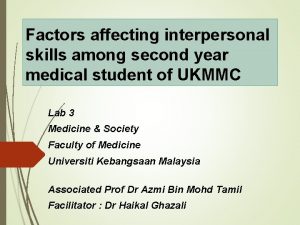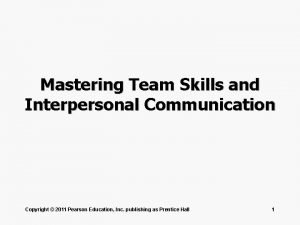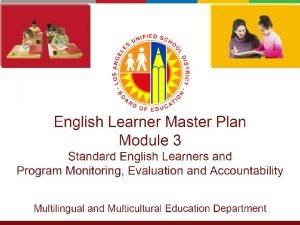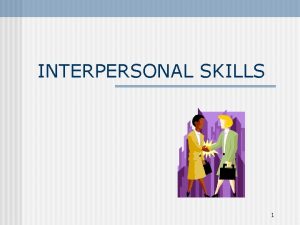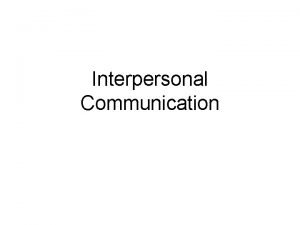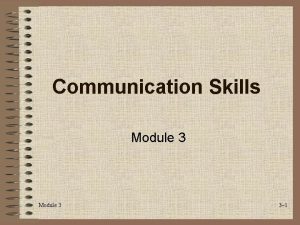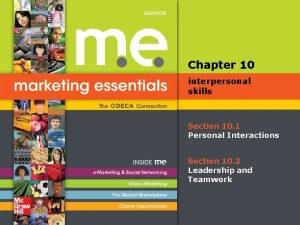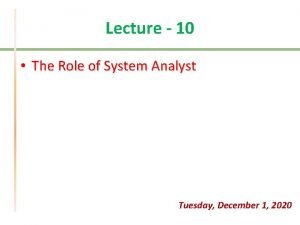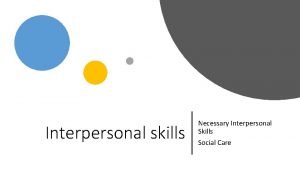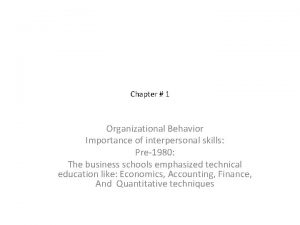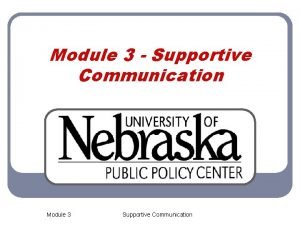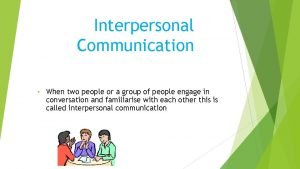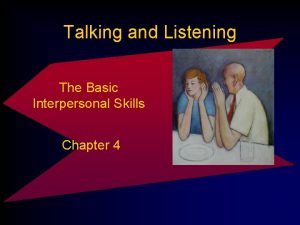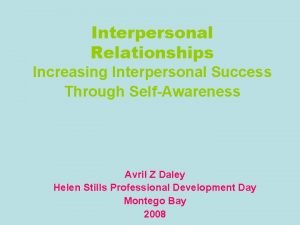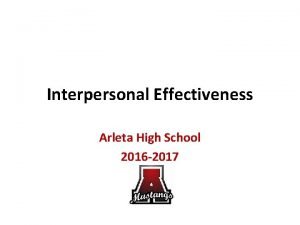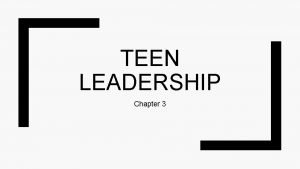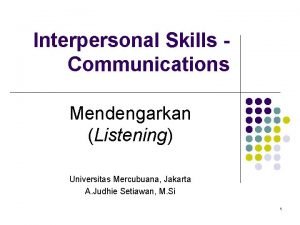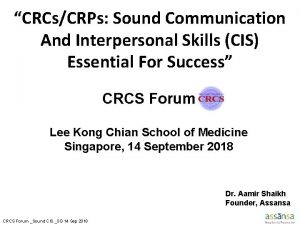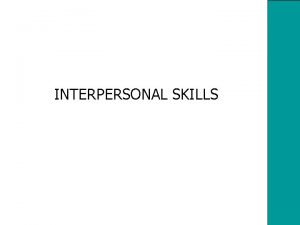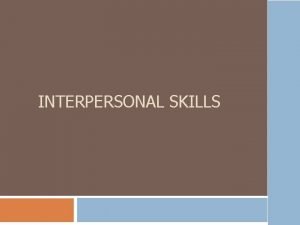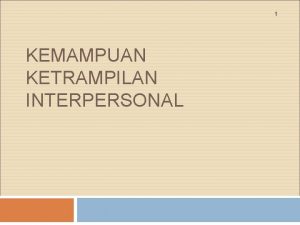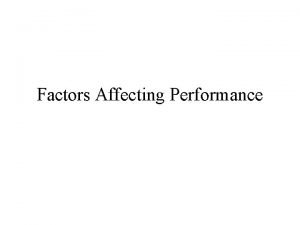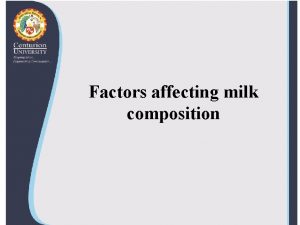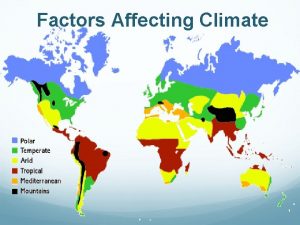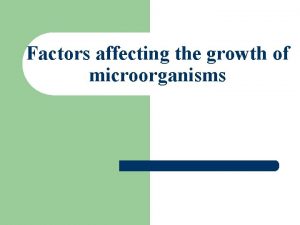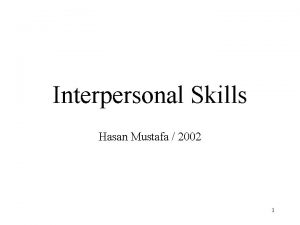Factors affecting interpersonal skills among second year medical
































- Slides: 32

Factors affecting interpersonal skills among second year medical student of UKMMC Lab 3 Medicine & Society Faculty of Medicine Universiti Kebangsaan Malaysia Associated Prof Dr Azmi Bin Mohd Tamil Facilitator : Dr Haikal Ghazali

MEMBERS OF LAB 3 ADNAN YAKUB A 147315 THAM KHOI MAN A 148352 SITI NORAISYAH BT MAHIDIN A 143614 SYAZLIYANA RAZALI AHMAD ASYRAF NORDIN A 147286 NINA HENRY A 148479 NUR AMIRAH FARHANAH HASHIM A 147308 NURUL AQILAH MOHD HASSAN A 148604 HAMIZHAH AN NADIAH BINTI AZLAN A 149493 NUR ‘ALLIA SHAFIQA MOKHTAR A 143669 MUHAMMAD NIZAM BIN SAHARON A 148631 NG SHEEN DEE A 147436 NOOR FARIHAH ZULYANA FOUZI AEMYRUL AINUL YAQIEN MOHD ZULHELMI TAN A 149648 ONG SEE KEONG A 149581 MOHAMAD AFIQ BIN ZULKIFLY A 143612 POON WEN QI A 149428 SITI THAHIRAH BINTI ABUL KALAM KANMANI A/P TANGGAYAH A 147321 A 148202 GA 02542 GA 02517

INTRODUCTION Conceptual Definition : Interpersonal skills is defined as those skills which one needs in order to communicate effectively with another person or a group of people. (Rungapadiachy, 1999, p. 193) Operative Definition : Interpersonal skills is the skills acquired to send clear messages, listen, give and receive feedback, and handle emotional interactions.

INTRODUCTION Different factors can influence individual interpersonal skills. Thus, by performing this study, we can determine several factors that affect the individual interpersonal skills.

DEFINITION Gender Conceptual : The state of being male or female. (Merriam. Webster Dictionary) Operative : The biological sex such as male or female. Modes of High School Conceptual : Secondary education level with a duration of five years. Operative : Classification of high school into two different categories, which are SBP/MRSM and Other Types of School such as regular day school etc.

DEFINITION Types of Pre-University Programme Conceptual : An intermediate course taken before entering into a university programme. (Edu. Spiral) Operative : The course taken, which lasts for one year (Matriculation/Asasi) or more than one year (STPM/ALevel/Foundation). Parents’ Education Level Conceptual : Parents’ highest level of schooling reached. It refers to institutions attended and certificates, degrees or diplomas obtained. (Statistics Canada, 2005) Operative : The highest level of education which falls into three categories, such as SPM or STPM or Degree/Master/Ph. D.

LITERATURE REVIEWS • Gender In line with previous research on gender differences, this study found a small tendency for women to score higher on ratings of interpersonal skills. (Hyde, 2005; Hyde & Linn, 1988; Stuhlmacher & Walters, 1999)

• Modes of High School The results showed that among the respondents who comprised 214 students from Maktab Rendah Sains Mara (MRSM) and fully boarding schools (Sekolah Berasrama Penuh), 116 students (54. 2%) were of the Extrovert-Intuition, 43 students (20. 1%) were Extrovert-Sensing, 31 students (14. 5%) were Introvert-Intuition and 24 students (11. 2%) were Introvert-Sensing, thus majority fall under extrovert category – friendly, talkative, sensitive and outgoing; able to communicate and connect with others; energetic; ingenious, imaginative, and creative with a global perspective. (Rio Sumarni Shariffudin; Lee Ming Foong; Hasuzila Hasan. 2006)

• Types of Pre-university Programme STPM background have good in basic skills in communication skills. Because they have taught about the basic skills in communication skils through “pengajaran dan pembelajaran” during in their school. (Sayed Mahussain & Fathiah; 2009)

• Parents’ Education Level Children of parents with an education level of Barchelor’s degree or higher performed better in social development assessments. (Emanique Matthews, 2008)

PROBLEM FRAMEWORK Modes of High School Factors Influence Types of Pre – University Programme Parents’ Education Level Gender Interpersonal Skills

GENERAL OBJECTIVE To determine factors affecting interpersonal skills among the second year medical students of Universiti Kebangsaan Malaysia.

SPECIFIC OBJECTIVES To determine the relationship between gender and interpersonal skills. To determine the relationship between the modes of high school and interpersonal skills. To determine the relationship between types of preuniversity programme and interpersonal skills. To determine the relationship between parents’ education level and interpersonal skills.

HYPOTHESIS Female students have higher interpersonal skills compared to male students. Students from SBP/MRSM have higher interpersonal skills compared to students from other types of schools. Students from STPM/A-Level/Foundation have higher interpersonal skills compared to students from Matriculation/Asasi. Students whose parents with degree/master/Ph. D qualification have higher interpersonal skills.

15 METHODOLOGY A) CROSS-SECTIONAL STUDY Ø measures the relationships of variables (manipulated and responding) in a defined population at one particular time. B) STUDY FIELD Ø PPUKM, Cheras.

16 C) CONVENIENT SAMPLING 93 medical students in PPUKM on 28 th October 2015 D) QUESTIONNAIRE Self administered

17 D) DATA ANALYSIS Microsoft Excel 2010 and SPSS version 17. 0 E) ANALYTIC STATISTIC Student t-test ANOVA test Significant level of p < 0. 05

RESULT Data Presentation and Data Analysis

Gender GENDER Male, 42 (45%) Female, 51 (55%) Male Female

Ho : There is no difference in the level of interpersonal skills between male and female medical students. Gender N Mean SD FEMALE 51 73. 00 11. 42 MALE 42 76. 38 14. 09 Gender Mean FEMALE 73. 00 MALE 76. 38 t-value p-value 0. 149 0. 204 p > 0. 05 – Not significant H 0 is not rejected CONCLUSION: There is no significant difference in the level of interpersonal skills between male and female medical students.

Modes of High School MODES OF HIGH SCHOOL SBP/MRS M, 36 (39%) Others, 57 (61%) SBP/MRSM Others

Ho : There is no difference in the level of interpersonal skills between students from SBP/MRSM and other types of school. Modes of High School N Mean SD SBP/MRSM 36 72. 97 14. 13 OTHERS 57 75. 51 11. 80 Mode of High School Mean SBP/MRSM 72. 97 OTHERS 75. 51 t-value p-value 0. 935 0. 352 p > 0. 05 – Not significant H 0 is not rejected CONCLUSION: There is no significant difference in the level of interpersonal skills between students from SBP/MRSM and students from other types of school.

Types of Pre-University Programme TYPES OF PRE-UNIVERSITY PROGRAMME STPM/ALevel/Foundation, 15 (16%) Matriculation/Asasi, 78 (84%) Matriculation/Asasi STPM/A-Level/Foundation

Ho : There is no difference in the level of interpersonal skills between the matriculation/Asasi and STPM/A-Level/Foundation. Pre-university Programme N Mean SD MATRICULATION/ASASI 78 75. 09 12. 51 STPM/ALEVEL/FOUNDATION 15 71. 60 13. 94 Pre-university Mean MATRICULATION/AS ASI 75. 09 STPM/ALEVEL/FOUNDATION 71. 60 t-value p-value 0. 972 0. 334 p > 0. 05 – Not significant H 0 is not rejected CONCLUSION: There is no significant difference in the level of interpersonal skills between the pre-university programmes – Matriculation/Asasi and STPM/A-Level/Foundation.

Parents’ Education Level PARENTS’ EDUCATION LEVEL SPM, 29 (31%) Degree/Maste r/Ph. D, 47 (51%) STPM, 17 (18%) SPM STPM Degree/Master/PHD

Ho : There is no difference in the level of interpersonal skills between the parents’ education levels. Parent’s Education Level N Mean SD SPM 29 72. 90 14. 59 STPM 17 74. 65 9. 77 Degree/Master/PH D 47 75. 49 12. 61 Parent’s Education Level Mean ANOVA P-value SPM 72. 90 STPM 74. 65 F= 0. 367 0. 694 Degree/Master/PH D 75. 49 p > 0. 05 – Not significant H 0 is not rejected CONCLUSION: There is no significant difference in the level of interpersonal skills between the parents’ education levels.

DISCUSSION Results There is no significant difference in the level of interpersonal skills between male and female medical students. Interpersonal skills include many aspects such as selfawareness, effective listening, questioning, oral communication, helping or assessing, assertiveness, reflecting and non-verbal communication. However, this research only focused on four aspects, which are sending clear messages, listening, giving and receiving feedback, and handling emotional interactions Apparently, women appeared to score higher on empathy, but lower on assertive communication as compared to men. There is no significant difference in the level of interpersonal skills between students from SBP/MRSM and students from other types of school. Soft skills have been incorporated into the Basic Vocational Education (PAV) through the curriculum outlined by the Ministry of Education Malaysia (MOE), which led to the construction of self-esteem, the development of entrepreneurial competencies and competency development of vocational skills suited for the application of Soft Skills that emphasize moral values in life.

DISCUSSION Results There is no significant difference in the level of interpersonal skills between the pre-university programmes – Matriculation/Asasi and STPM/A-Level/Foundation. It was found out that all the pre-university programmes not only focus on curriculum and academic, but also highlights the importance of soft skills and communication skills through the participation in extra-curricular activities, social clubs and organisations provided such as Students Council. There is no significant difference in the level of interpersonal skills between the parents’ education levels Parents’ education level do not play a significant role in developing an individual’s interpersonal skills because a child spends more time in schools, involving in curriculum and extracurricular activities. Besides, this aspect is also affected by the total time spent between the parents and the children. Thus, parents’ education level is not the sole factor which affects a child’s interpersonal skills.

Limitation and Suggestion Limitation Suggestion i. - Small sample size - Use a large sample size. For example, a total number of 500 medical students of UKM ii. - Non-randomised sample - Pick 100 subjects randomly from each year of study in order to make sure that the sample is randomised. iii. - Validity of the questionnaire because it is obtained from a previous research paper in year 1971 - Use the questionnaire from year 2000 onwards - Design and validate a questionnaire by professional person from particular field iv. - Overwhelming of questions in the questionnaire - Modify the questionnaire to contain only 20 questions which are specific to cover all the aspects of interpersonal skills.

CONCLUSION Gender, modes of high school, types of preuniversity programme and parents’ education level are not the factors affecting interpersonal skills among second year medical students of UKMMC.

REFERENCE • Bienvenu. M. j. , SR. Measurement of Parent Adolescent Communication, The Family Coordinator, 1969, 18, 117 -121 • Bienvenu. M. j. , SR. Measurement of Marital Communication, The Family Coordinator, 1970, 19, 26 -31(a) • Bienvenu. M. j. , SR. Measurement of Parent Adolescent Communication, and self esteem. Jurnal of Home Economics. 1970, 62, 334 -335(b) • Bienvenu. M. j. , SR. An Interpersonal Communication Interventory The Journal Of Communication, 1971, 21(4), 381 -388 • Emanique Matthews. (August 2008). Investigating The Association Of Parental Influence And Children’s School Readiness and Early Academic Achievement : An analysis Using Early Childhood Longitudinal Study- Kindergarten (ECLS-K), (pp 58) • Sayed Mahussain Bin Sayed Ahmad & Fathiah Binti. Mustaffa. Fakulti Pendidikan, Universiti Teknologi Malaysia. Kemahiran Berkomunikasi Secara Berkesan Dalam Kalangan Pelajar Sarjana Muda Sains Serta Pendidikan. (2008) • Ministry of Education Malaysia (2011 b). Kertas Cadangan Bil. 4/2011 , Mesyuarat Jawatankuasa Kurikulum Pusat. Putrajaya: Bahagian Pendidikan Teknik dan Vokasional. • Mustapa Mohamed. (2007, July 14). Ketiadaan Kemahiran Insaniah Punca Siswazah Menganggur, Kata Mustapa. Attach at July 30, 2012 from http: //www. bernama. com/

THE END THANK YOU
 Factors affecting interpersonal skills
Factors affecting interpersonal skills Intrapersonal and interpersonal communication
Intrapersonal and interpersonal communication The factors affecting the communication process
The factors affecting the communication process Psychological factors affecting medical condition
Psychological factors affecting medical condition Wiki
Wiki Intrapersonal skills
Intrapersonal skills Speaking skills ppt
Speaking skills ppt Mastering team skills and interpersonal communication
Mastering team skills and interpersonal communication Communication english skills
Communication english skills Special skills on job application
Special skills on job application Interpersonal conflict resolution skills
Interpersonal conflict resolution skills Communication and interpersonal skills
Communication and interpersonal skills Interpersonal communication barriers
Interpersonal communication barriers Interpersonal skills opposite
Interpersonal skills opposite Module 3 communication/interpersonal skills
Module 3 communication/interpersonal skills 10 interpersonal skills
10 interpersonal skills Interpersonal skills of system analyst
Interpersonal skills of system analyst Characteristics of interpersonal skills
Characteristics of interpersonal skills Social work interpersonal skills
Social work interpersonal skills Chapter 6 interpersonal communication
Chapter 6 interpersonal communication Interpersonal skills in organizational behavior
Interpersonal skills in organizational behavior Supportive communication examples
Supportive communication examples Interpersonal skills in business communication
Interpersonal skills in business communication Interpersonal skills in marketing
Interpersonal skills in marketing How to pronounce interpersonal skills
How to pronounce interpersonal skills Technical skills of system analyst
Technical skills of system analyst Basic interpersonal skills
Basic interpersonal skills Interpersonal relationship
Interpersonal relationship Interpersonal communication examples
Interpersonal communication examples Interpersonal skills in soul surfer
Interpersonal skills in soul surfer Listening in interpersonal communication
Listening in interpersonal communication Assansa
Assansa Competency model clearinghouse
Competency model clearinghouse
